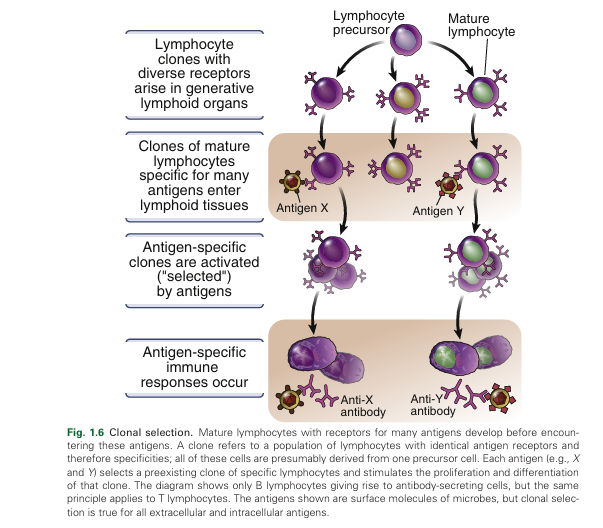


 النبات
النبات
 الحيوان
الحيوان
 الأحياء المجهرية
الأحياء المجهرية
 علم الأمراض
علم الأمراض
 التقانة الإحيائية
التقانة الإحيائية
 التقنية الحيوية المكروبية
التقنية الحيوية المكروبية
 التقنية الحياتية النانوية
التقنية الحياتية النانوية
 علم الأجنة
علم الأجنة
 الأحياء الجزيئي
الأحياء الجزيئي
 علم وظائف الأعضاء
علم وظائف الأعضاء
 الغدد
الغدد
 المضادات الحيوية
المضادات الحيوية|
Read More
Date: 6-11-2015
Date: 2024-12-17
Date: 8-11-2015
|
The adaptive immune system is capable of distinguishing millions of different antigens or portions of antigens, a feature that is referred to as specificity. It implies that the total collection of lymphocyte specificities, sometimes called the lymphocyte repertoire, is extremely diverse. The total population of B and T lymphocytes consists of many different clones (each clone made up of cells all derived from one lymphocyte), and all the cells of one clone express identical antigen receptors, which are different from the receptors of all other clones. We now know the molecular basis for the generation of this remarkable diversity of lymphocytes. The clonal selection hypothesis, formulated in the 1950s, correctly predicted that clones of lymphocytes specific for different antigens develop before an encounter with these antigens, and each antigen elicits an immune response by selecting and activating the lymphocytes of a specific clone (Fig. 1.6).
The diversity of the lymphocyte repertoire, which enables the immune system to respond to a vast number and variety of antigens, also means that before exposure to any one antigen, very few cells, perhaps as few as 1 in 100,000 or 1 in 1,000,000 lymphocytes, are specific for that antigen. Thus, the total number of lymphocytes that can recognize and react against any one antigen ranges from approximately 1,000 to 10,000 cells. To mount an effective defense against microbes, these few cells have to give rise to a large number of lymphocytes capable of destroying the microbes. Each unique lymphocyte that recognizes a single antigen and its progeny constitute an antigen-specific clone.
The effectiveness of immune responses is attributable to several features of adaptive immunity, including the marked expansion of the clone of lymphocytes specific for any antigen upon exposure to that antigen, the selection and preservation of the most potent lymphocytes, and numerous positive feed- back loops that amplify immune responses.




|
|
|
|
للتخلص من الإمساك.. فاكهة واحدة لها مفعول سحري
|
|
|
|
|
|
|
العلماء ينجحون لأول مرة في إنشاء حبل شوكي بشري وظيفي في المختبر
|
|
|
|
|
|
|
العتبة العباسية تعلن أسماء الفائزين بمسابقة ولادة السيدة فاطمة الزهراء (عليها السلام)
|
|
|